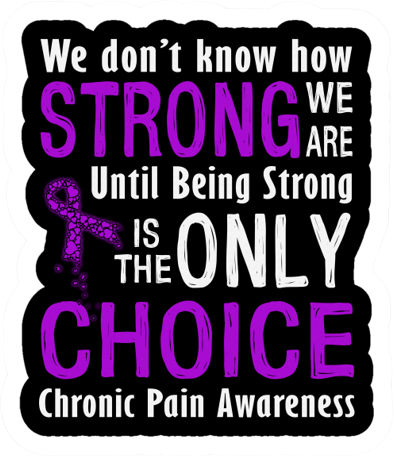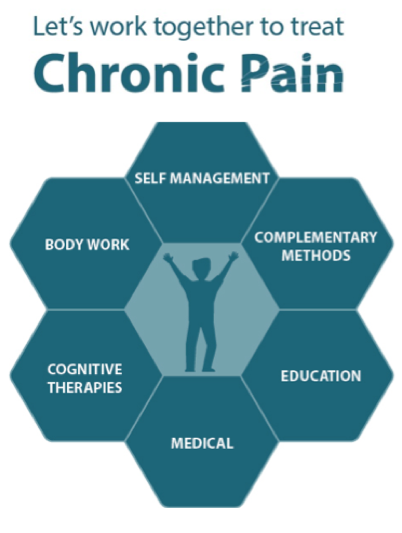
Chronic pain lasts for several months or years. It interferes with daily life and can cause anxiety and depression. The first step in treating chronic pain involves finding and treating the cause. If that is not possible, the most effective approach is a combination of therapies, medications, and lifestyle changes.
What is chronic pain?
Chronic pain is pain that stays for over four months. The pain can be present all the time, or it can come and go. It can happen anywhere in the body. Chronic pain interferes with your daily activities, such as having a social life, working, and taking care of yourself or others. It may lead to anxiety, depression, and trouble sleeping, making your pain worse. This response creates a cycle that is difficult to break.

Difference between other pain and chronic pain?
Chronic pain is different from other types of pain known as acute pain. Acute pain occurs when you get hurt, like experiencing a broken bone or a simple cut to your skin. It does not last long, and it disappears after your body heals from the cause of the pain. In contrast, chronic pain lasts long after recovering from an illness or injury. Sometimes it also happens for no apparent reason.
Where do people commonly have chronic pain?
Chronic pain can come in various forms and appear across your body. Common types of chronic pain are arthritis, joint pain, neck pain, back pain, headaches, including migraines, lasting pain in scar tissue, testicular pain (orchialgia), neurogenic pain, from damage to the nerves or other parts of your nervous system, and muscle pain all over (such as with fibromyalgia).
Do you know common is chronic pain?
Chronic pain is a pretty common health condition and one of the most common reasons people seek medical care. Approximately 26% of adults in the US experience chronic pain.
Chronic pain affects a minimum of 10 percent of the world’s population, i.e., approximately 60 million people – with estimates of the prevalence of chronic pain closer to 20 to 25 percent in some regions and countries. An additional one in ten individuals develops chronic pain each year worldwide.
Causes of Chronic Pain?
Sometimes chronic pain has an apparent cause. You can have a long-lasting illness like arthritis that may cause ongoing pain. Diseases and injuries can also cause changes to the body that leave you more sensitive to pain. These changes may stay in place even after healing from the original disease or injury. Something like a broken bone, a sprain, or a brief infection can leave you with chronic pain.
Some people also have chronic pain not tied to physical illness or injury. Healthcare providers call this psychosomatic pain or response psychogenic pain. It is often caused by psychological factors such as depression, stress, and anxiety. Scientists believe this connection between pain and anxiety comes from low levels of endorphins in our blood. Endorphins are natural chemicals triggering positive feelings. It is possible to have many causes of pain overlap. For example, you might have two different diseases. Or you could have something like psychogenic pain and migraines together.
What does chronic pain feel like?
People having chronic pain describe their pain in various ways, such as burning, aching, squeezing, throbbing, shooting, stiffness, and stinging. Chronic pain usually leads to other symptoms and conditions, such as fatigue or feeling overly tired most of the time, anxiety, mood swings, insomnia, trouble falling asleep, and depression.
How is chronic pain diagnosed?
Chronic pain is usually a symptom, so your healthcare provider needs to determine what is causing your pain. Pain is subjective, i.e., only the person experiencing chronic pain can identify and describe it. If you experience chronic pain, see your healthcare provider. Your doctor will ask you where your pain is, how often it occurs, how intense it is, on a scale of 1 to 10, how much it is affecting your work and life, and whether you have a lot of anxiety or stress in your life, what makes it better or worse, and whether you have had any surgeries or illnesses.
What tests diagnose chronic pain?
Your doctor can physically examine your body and order tests to look for the cause of the pain. They can have you undergo these tests- nerve conduction studies to check if your nerves are reacting appropriately, blood tests, imaging tests, like X-rays and MRI, reflex and balance tests, electromyography to test muscle activity, urine tests, and spinal fluid tests.
How is chronic pain managed or treated?
In order to relieve chronic pain, doctors first try to identify and treat the cause. But sometimes, they can not find the source. If so, they turn to managing or treating the pain. Healthcare providers treat chronic pain in various ways. The approach depends on many factors, such as the type of pain you have, your age and overall health, and the cause of your pain, if known.
The best treatment plans for chronic pain use various strategies, like medications, lifestyle changes, and therapies. If you experience chronic pain and depression or/and anxiety, it is essential to seek treatment for your mental health condition as well. Having anxiety or depression makes your chronic pain worse. If you have depression, fatigue, decreased activity, and sleep changes can worsen your chronic pain.
What medications can treat chronic pain?
The doctor can recommend certain medications to relieve chronic pain, such as:
- Antidepressants such as tricyclic antidepressants
- Anticonvulsants (drugs that prevent seizures) for nerve pain and corticosteroid.
- Nonsteroidal anti-inflammatory drugs (NSAIDs) or acetaminophen
- Muscle relaxers or topical products (applied to the skin) containing pain relievers or ingredients that create soothing heat or cold.
- Opioids (narcotics)
- Sedatives to help with anxiety or insomnia and medical marijuana.
- Other medical treatments your doctor can have you try are transcutaneous electrical nerve stimulation (TENS), nerve blocks, and epidural steroid injections.
Can lifestyle changes help with your chronic pain?
Four major lifestyle factors affect your chronic pain and help reduce it. They are:
- Stress: Stress plays a significant role in chronic pain, so it is crucial to reduce your stress as much as possible. Every individual has different techniques to manage their stress, but some methods include mindfulness, meditation, and deep breathing. You must try different options until you know what works best for you.
- Exercise: Participating in low-intensity activities, like light swimming or walking, for 30 minutes every day can help reduce your pain.
- Diet: It is essential to eat a healthy diet to boost overall health. Your doctor can suggest trying an anti-inflammatory diet by eliminating foods that can cause inflammation, such as refined carbohydrates and red meat.
- Sleep: Getting adequate quality sleep is necessary for your overall health. A lack of sleep may cause you to gain weight, making your chronic pain worse. Discuss these four lifestyle pillars with your doctor to determine how each applies to your type of chronic pain. You must understand how you can incorporate changes into your daily life to relieve your chronic pain.
Conclusion
Chronic pain lasts for an extended period spanning many months or years and can interfere with your ability to work, study, enjoy activities, and the overall quality of your life. Please consult your healthcare provider or pain specialist if you have chronic pain. There are techniques to manage your chronic pain to help you lead a more comfortable life.
